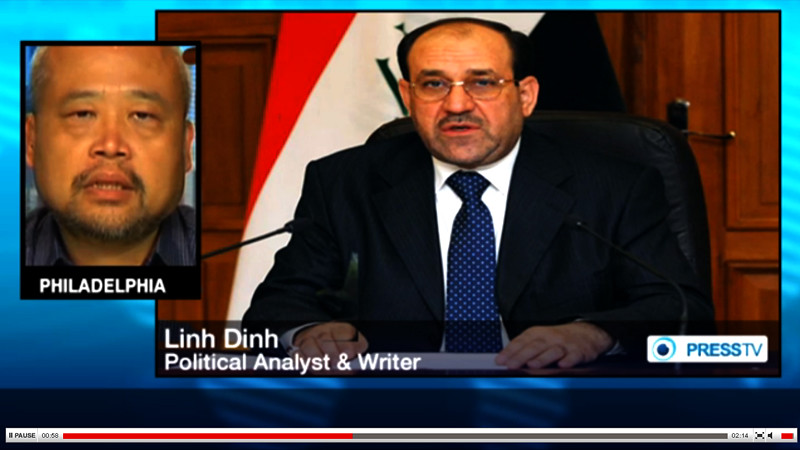The abbreviated transcript doesn't include some of the key points I made on air, so I've fleshed it out here, with the additions in bold. Iran's Press TV, 1/18/14:
The United States invaded Iraq and subsequently “broke up” the chaos-stricken country in order to “weaken” it, a political analyst and writer in Philadelphia says.
The US waged a nearly 9-year war on Iraq, starting from 2003, after Congress passed the Iraq War Resolution in 2002, authorizing military action against the country.
“The US broke up this country to weaken it, so this ongoing war and chaos is entirely predictable,” Linh Dinh told Press TV on Saturday.
Dinh added, "Al-Maliki came to power under the US occupation, and although American ground troops are no longer there, he’s still dependent on American money and weapons to wage war against his own people. Al-Maliki is a Shiite, and his main opponents in Iraq are the Sunnis, who by and large do not accept his US-backed government. The Kurds also fall outside his jurisdiction for they have their own autonomous region in the North. As a consequence of the US invasion, Iraq is no longer a unified country, and it won’t ever regain its former shape and unity, for there is no scenario in which the Kurds would want to give up their relative independence, for example [... ] With American soldiers gone, the US media is no longer paying much attention to Iraq, but hundreds of people continue to die each month.”
On Friday, the Pentagon announced it would deliver new arms and ammunition to Iraq to fight Sunni militants currently in control of key cities in Anbar province.
A Pentagon spokesman said that Iraq will be receiving “several thousand” M-16 and M-4 rifles with ammunition as requested by Baghdad.
Dinh criticized Iraq’s Prime Minister Nouri al-Maliki for requesting weapons from the US because it “weakens his government’s legitimacy further [...] Al-Maliki’s helplessness is actually useful to the US, since it forces him to continue to rely on America. Without his current trouble, he might act too independently and become closer to Iran, for example, but even with all this support from the US, al-Maliki might still lose to the rebels, for his government is illegitimate and corrupt, and his army weak and demoralized. In a remarkable development, the poorly armed Sunni rebels have just retaken Fallujah."
The recent internal conflicts in Iraq, including deadly clashes between the Iraqi army and Sunni militants in the city of Fallujah, have war hawks calling for the US to go back to the country.
According to the United Nations, at least 8,000 people lost their lives in Iraq in 2013.
AHT/HJ
.

No comments:
Post a Comment